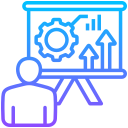The Rise of Digital Coaching Platforms
The emergence of digital coaching platforms is transforming personal and professional development in unprecedented ways. Where traditional coaching was limited by geography, time, and accessibility, digital solutions have paved the way for tailored, instant, and scalable support for individuals and organizations. These platforms leverage cutting-edge technology, from artificial intelligence to real-time analytics, bringing impactful learning and growth straight to users’ devices. As demand for flexible and effective coaching surges, digital coaching platforms are becoming essential tools in fostering skills, enhancing performance, and driving holistic development around the world.

Historically, coaching relationships evolved through in-person sessions that required scheduling, travel, and often significant financial commitments. The digital transformation that swept across all service industries made its way into the world of coaching, introducing tools that facilitate remote communication, document sharing, and goal tracking. This revolutionized not just convenience, but also the scale at which coaching could be provided, setting the stage for mass adoption and inclusion.


Artificial Intelligence in Coaching
AI-driven algorithms are able to analyze user data, generate real-time feedback, and even predict potential challenges before they arise. Virtual assistants and chatbots can provide support at any hour, complementing human coaching interactions. These intelligent systems continuously learn from each engagement, refining their responses and ensuring that the coaching experience becomes increasingly effective over time. Such advancements have set new standards for responsiveness and adaptability in the coaching process.
Seamless Communication and Connectivity
With the development of high-quality video conferencing and instant messaging, the distance between coach and coachee has been virtually erased. Technologies facilitate face-to-face conversations, live feedback, and immediate resource sharing, regardless of participants’ locations. Integrated platforms allow for record-keeping, note-sharing, and progress tracking, bringing a previously fragmented experience into a cohesive and dynamic digital environment. This seamless connectivity significantly enhances engagement and accountability between coaches and their clients.
Data-Driven Insights and Analytics
Digital coaching platforms gather vast amounts of data on user engagement, progress, and outcomes. Advanced analytics tools interpret this data to offer actionable insights for continuous improvement. Coaches can identify patterns, pinpoint strengths and areas for development, and adjust strategies in real time. Clients benefit from clear visualizations of their journey, driving motivation and helping to set realistic, achievable goals. As analytics grow more sophisticated, the capacity for genuinely transformative coaching is heightened.
Benefits for Individuals and Organizations
01
Personalized Development Journeys
Individuals leveraging digital coaching platforms can shape a growth journey that aligns perfectly with their career objectives, personal aspirations, and preferred learning styles. Unlike one-size-fits-all programs, digital coaching adapts dynamically to evolving needs, offering targeted exercises, curated resources, and ongoing encouragement. This focus on personalization not only accelerates development but also fosters a deeper commitment to continuous learning, helping users reach their full potential more efficiently.
02
Organizational Performance Enhancement
For organizations, digital coaching platforms have become strategic assets in workforce development. These tools enable HR leaders to quickly deploy scalable learning initiatives across global teams, track outcomes, and respond to skills gaps with precision. Employees benefit from ongoing support that translates into greater job satisfaction, productivity, and retention. By embedding coaching into the professional landscape, organizations build cultures of excellence, agility, and innovation.
03
Flexibility and Accessibility
One of the most significant advantages of digital coaching platforms is their unmatched flexibility. Users can access sessions and resources on-demand, fitting coaching seamlessly into even the most demanding schedules. This approach removes traditional barriers such as travel, in-person commitments, or time zone differences. As a result, both individuals and organizations experience smoother adoption, higher participation rates, and stronger outcomes compared to conventional coaching formats.

Keeping users motivated and consistently engaged is a pressing challenge for digital coaching platforms. Unlike face-to-face interactions, which can foster accountability through personal rapport, digital environments may sometimes feel impersonal or detached. To combat this, platforms are integrating gamification elements, social features, and regular check-ins to drive participation and commitment. Personalized reminders, rewards, and a strong community aspect play crucial roles in maintaining momentum throughout the coaching journey.

Handling sensitive personal and organizational information responsibly is paramount in digital coaching. Platforms must uphold stringent data protection standards, utilizing encryption, secure storage, and transparent privacy protocols. Ongoing education for coaches and users about best practices in digital security further reinforces trust. As regulations evolve and technology advances, continuous investment in security measures remains essential to protect users and safeguard organizational interests.

Establishing genuine rapport between coach and coachee can be more challenging in digital settings, where non-verbal cues and informal interactions are less apparent. Forward-thinking platforms address this by offering high-definition video, interactive tools, and collaborative digital spaces that replicate aspects of in-person communication. Training coaches to foster empathy and active listening through virtual mediums is equally important, ensuring that the human element remains central to every coaching experience.
Impact on Career Advancement and Leadership
The rapid evolution of professional landscapes demands continual upskilling. Digital coaching platforms respond by providing curated resources, personalized learning paths, and targeted practice scenarios to help users master new competencies quickly. This agility empowers individuals to stay relevant in fast-changing industries, navigate career transitions, and achieve long-term goals. The direct feedback loop built into digital coaching enables users to adjust strategies and fine-tune skills in real time, driving continuous improvement.

Integrating Digital Coaching with Broader Learning Ecosystems
Unified Learning Experiences
A major advantage of integrating coaching with broader ecosystems is the creation of unified, cohesive learning experiences. Users can move smoothly between self-paced courses, live coaching sessions, and peer collaboration, all within a single digital environment. This holistic approach encourages continuous skill-building, fosters stronger retention, and ensures that learning is applied in practical, real-world contexts. Organizations benefit from more engaged and capable teams who utilize diverse resources for growth.


Real-Time Feedback and Performance Support
Digital coaching platforms offer immediate, actionable feedback that complements formal training initiatives. When connected with learning management or performance systems, coaching becomes an ongoing source of support that addresses challenges as they arise. This real-time intervention enables both individuals and teams to quickly adapt, course-correct, and build confidence in their abilities. The result is a culture of proactive problem-solving and continuous improvement, critical for lasting success.
The Role of Artificial Intelligence in the Coaching Journey
AI-powered algorithms are increasingly used to match users with coaches whose expertise and communication styles best fit their unique preferences and goals. By analyzing detailed user profiles, learning histories, and interaction patterns, these systems significantly boost the likelihood of a productive coaching relationship. This smart matching process ensures that coaching interventions are both relevant and resonant, maximizing engagement and positive outcomes.

